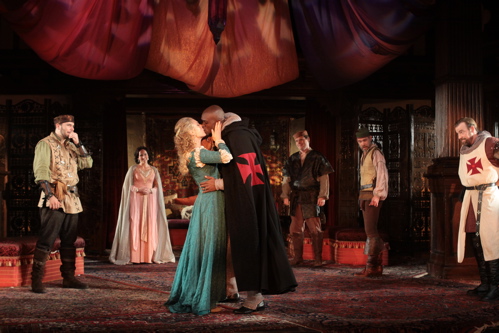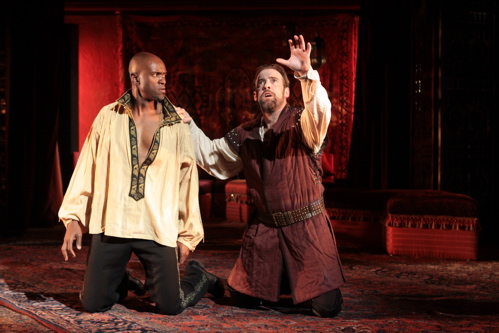
(Center) Janie Brookshire as Desdemona and Owiso Odera as Othello with the cast of Shakespeare's Othello, on stage at Folger Theatre through December 4, 2011. Photo credit: Carol Pratt.
There’s a moment in Folger Theatre’s Othello that sums up director Robert Richmond’s insightful approach. Courtesan Bianca, transformed in this production into a saucy bellydancer played by Zehra Fazal, stands in the wind, staring at a small fluttering handkerchief. At the same time, Othello himself (a commanding Owiso Odera) struggles with the depths of jealous rage that will eventually destroy him. An innocuous piece of fabric has become a thing of horror for them both, a symbol of betrayal that will bring about murder. Something so simple, now so powerful.
That handkerchief gets talked about a lot in Othello, Shakespeare’s tragedy about the loss of reputation and love through envy and greed, but this is the first time I’ve seen it so clearly as a totem of evil. Othello’s father gave it to his mother as a magical charm with the power to possess, after all. You wish Bianca would just let the damn thing go, flying off into the wind. But she doesn’t.
None of us ever do.
Washington audiences have a chance to contrast two great productions of Othello – Synetic’s revival of their 2010 wordless version, and now Folger’s performance of the classic text, already extended through December 4. With both, though the racial divide does play a strong part, it’s the corrosive poison of jealousy that’s explored most fully.

Owiso Odera as Othello and Ian Merrill Peakes as Iago in Shakespeare's Othello, on stage at Folger Theatre through December 4, 2011. Photo credit: Carol Pratt.
It’s all tied together by a gorgeously simple set design by Tony Cisek, perfectly evoking both Venice and Cyprus by working with the existing Elizabethean elements of the theater. Cisek turns a setting that sometimes is so challenging into a perfectly blended atmosphere – the theater’s dark wood accented by carved screens, an elaborate bedroom cornice that magically becomes the doge’s palace, a ship, an ornate ceiling. You can almost smell exotic perfume, incense – and lust for power.
You can also see that lust glinting in the eyes of Ian Merrill Peakes, just as you can see the fear of it in Janie Brookshire’s eyes as Desdemona, as his trap tightens around her. Merrill Peakes makes for a burly, charming Iago, a man quick to smile. Beware that smile, as it pulls the audience in and makes us complicit. When Desdemona gratefully kisses him, unknowing that he’s just ensured her death, his delight in it is palpable – and what makes it so chilling is that it makes absolutely no difference to his plan. This is an Iago who, upon encouraging Othello to strangle his wife, takes voyeuristic pleasure in the thought – and there’s no mistaking that his pleasure is sexual. It’s a breathtakingly sick moment.
The fascinating directorial touches coupled with strong choices by actors makes for an acutely heartbreaking Othello. It’s impossible not to be moved as moments between characters like Othello and his lieutenant Iago, or Iago and his wife Emilia (Karen Peakes), take on an almost private, psychologically internal feel. Watching Peakes as Emilia die after realizing the awful wreckage is caused by her husband, her worried eyes flashing into vengeance – I dare you not to cry. The psychological torment is ratcheted up by the ever present sound design of Matthew M. Nielson and Anthony Cochrane’s composition, from the twitchy aural undercurrents of Othello’s madness to echoing Venetian halls to sad, windy trees.
It’s part of the play’s heritage that somehow the namesake character can get overshadowed by his evil second. Othello’s always a difficult role, as the audience is seduced by Iago just as he is – here Odera’s Othello is a seasoned Templar knight, older than his young bride and therefore a little too susceptible to midlife insecurities. Though he plays to the fits and madness a bit too disjointedly, his playful roughhousing of Iago and his early indulgence of Desdemona alerts us that this Othello’s desire to be the best and to be liked while doing it will be the key to his downfall. It also shows us the root of Iago’s hatred of him, as he play-fights too hard, keeping Iago down like a bad dog. This Othello is the brilliant warrior more comfortable in battle, dispensing justice too quickly for the dangerous nuances of peacetime.
The text is front and center in Folger’s production, spoken with great clarity in an American English delivery devoid of flourishes – a style that’s become Folger’s signature. With psychologically intense performances and a seductive production design, this Othello will stay in my mind a long time.
With psychologically intense performances and a seductive production design, this Othello will stay in my mind a long time.
Folger Theatre’s production of Othello performs an extended run through December 4 at the Folger Shakespeare Library, located at 201 East Capitol Street SE, Washington, DC 20003. Closest Metro stop: Capitol South (Blue/Orange lines). For more information call 202-544-7077.


“The text is front and center in Folger’s production, spoken with great clarity in an American English delivery devoid of flourishes – a style that’s become Folger’s signature.”
Say what? Again, huh? What US Shakespeare company worth any mention doesn’t perform his plays with a standard American dialect? How can that possibly be The Folger’s “signature”?
And don’t two actors use a sort of Mediterranean accent in the play? Despite its usefulness for the production, wouldn’t that be a flourish?
Hi “butHUH?” – thank you for your comment. The “signature” style I’m referring to is one that first and foremost places paramount importance on delivering the text as clearly and plainly as possible. I think also that Folger actors do tend to use a more straightforward American dialect devoid of “flourish,” by which I mean a sort of stilted cadence, running up and down vocal scales for no other reason that to sound melodic. I rarely hear that kind of delivery at Folger.
Accents are distinct directorial choices. I didn’t consider those two as flourishes. However, your comment makes me wonder – do you think those accents were useful to the plot, or were they distracting?
In any case, I hope this clarifies my intended meaning. Thank you for reading.
Othello is a play I have been studying a lot lately and I find it really interesting to read about how it was handled in this production. The handkerchief is something I hadn’t thought too much about before as a huge token of evil. I even wondered if Othello made up the story about it to get a reaction out of Desdemona, I mean, why had he not told her the story before? Why would he give her something so precious when they just started courting and it was likely they would not work out?
This small, old piece of cloth is what brings about the murder in the end (when it is used by evil people). It is interesting how the placement of an inanimate, fragile thing is a stronger testimony than that of Desdemona, a virtuous honorable lady.
I wish I could see this production for myself.
Hi Mason, thanks very much for your comment! I agree, the conceit of the handkerchief has always bothered me as well, which is why I loved how this director highlighted it almost as a thing of horror itself.
Also in this production, Desdemona’s innocence is very strongly highlighted – she’s a very young woman of no guile at all, speaking her mind freely to Othello, and being seen speaking freely to men like Cassio. That innocent charm is twisted against her by Iago when he calls her virtue into question to Othello, so that when Othello calls her a whore, it’s heartbreaking.
Come visit DC sometime! We have great theater here. Thanks again for commenting.
Great review, Jenn. I cannot wait to see this play. Ian Merrill Peakes was amazing in Folger’s Henry VIII, so when I read he was cast as Iago that made this a must see. Seriously, how good is the Folger? The quality of their productions make far too much of the STC fare seem embarrassing by comparison. If only the Folger had a real bar inside – now that would be something!
Pingback: Best Of: Theater 2011 » We Love DC